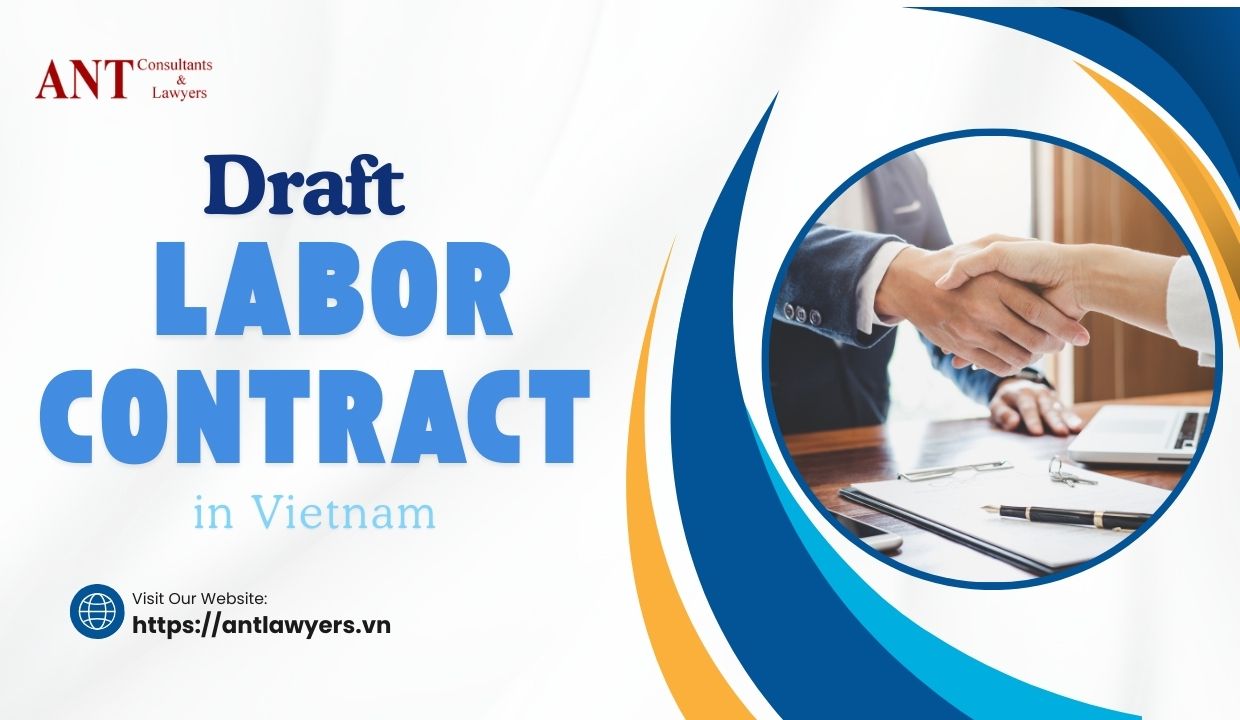Navigating Legal Requirements: Draft Labor Contract in Vietnam for Foreign Employee


Draft_Labor_Contract_in_Vietnam
Vietnam’s vibrant economy and increasing global integration have led to a rising demand for foreign talent. As businesses seek to tap into this international pool, the need to draft labor contract in Vietnam for foreign employee has becomes a pivotal aspect of the employment process.
This article will comprehensively explore the intricacies to draft labor contract in Vietnam for foreign employee, shedding light on key considerations and legal requirements.


Understanding the Significance to Draft Labor Contract in Vietnam
Labor Contract in Vietnam serves as the foundational document outlining the terms of employment between an employer and a foreign employee. This legally binding agreement is crucial for maintaining a transparent and harmonious employer-employee relationship while ensuring compliance with Vietnamese labor laws.
Addressing Visa and Work Permit Regulations
To draft labor contract in Vietnam for foreign employees begins with addressing the fundamental requirement of obtaining a work permit and visa. In Vietnam, employers play a pivotal role in initiating the work permit application process in Vietnam.
The Labor Contract in Vietnam should explicitly emphasize the necessity of a valid work permit, detailing the steps involved in obtaining one and the implications of non-compliance.
Clarity on Terms and Conditions
Ensuring clarity in the terms and conditions outlined when proceeding to draft labor contract in Vietnam is paramount. The document could be presented in both Vietnamese and English to prevent misunderstandings. Crucial elements such as job responsibilities, working hours, compensation structure, benefits, and any special provisions related to the employee’s role should be clearly articulated.
Compliance with Vietnamese Labor Laws
Adherence to Vietnamese labor laws is non-negotiable when drafting a labor contract. Provisions related to working hours, overtime, annual leave, and termination procedures must align with the country’s labor regulations. A well-crafted draft labor contract in Vietnam not only safeguards the rights of foreign employees but also shields employers from potential legal disputes arising from non-compliance.
Inclusion of Specific Clauses for Foreign Employees
The Labor Contract in Vietnam for foreign employees necessitates the inclusion of specific clauses tailored to their unique circumstances. These may include:
Language Proficiency Requirements
Clearly stipulate any language proficiency requirements essential for effective communication within the workplace.
Cultural Integration
Address any specific expectations or training programs related to cultural integration. This can be particularly relevant for foreign employees adjusting to a new work environment.
Tax Obligations
Articulate the tax obligations of both the employer and the foreign employee in the Labor Contract in Vietnam. Considerations may include tax equalization and tax protection policies to provide clarity on financial responsibilities.
Repatriation Expenses
Detail provisions related to repatriation expenses and responsibilities in the event of contract termination. This ensures a clear understanding of the process and financial implications.
Dual-Language Contracts and Translation Services
Given the diverse nature of the expatriate workforce in Vietnam, Labor Contracts should ideally be presented in dual languages. English is commonly used for this purpose, but the language choice should align with the employee’s proficiency. Employers may also consider providing translation services to guarantee a comprehensive understanding of the contract terms by foreign employees.
Dispute Resolution Mechanisms
Incorporating a clear mechanism for dispute resolution is a prudent step when proceeding to draft labor contract in Vietnam. The document should outline the steps involved in dispute resolution, emphasizing mediation before resorting to legal action. A transparent dispute resolution process fosters a positive work environment and minimizes the impact of potential conflicts.
Benefits and Perks
Foreign employees often expect specific benefits and perks as part of their employment package. These may include housing allowances, health insurance, and provisions for international schooling if they relocate with their families. Employers should explicitly outline these benefits in the Labor Contract in Vietnam to manage expectations and demonstrate commitment to employee well-being.
Continuous Monitoring of Legal Changes
Vietnamese labor laws are dynamic, subject to changes that can impact existing Labor Contracts. Employers must stay informed about any amendments and regularly review and update contracts to align with the latest legal requirements. This proactive approach ensures ongoing compliance and mitigates potential legal risks.
In conclusion, navigating the legal requirements when proceeding to draft labor contract in Vietnam for foreign employees demands meticulous attention to detail and a comprehensive understanding of both the country’s labor laws and the unique needs of the international workforce.
The Labor Contract in Vietnam serves as a critical document that not only outlines the terms of employment but also establishes the foundation for a positive and legally sound working relationship.
By addressing visa regulations, ensuring clarity in contract terms, and staying abreast of legal changes, employers can create an environment conducive to the success and satisfaction of both foreign employees and the organizations they serve.
About ANT Lawyers, a Law Firm in Vietnam
We help clients overcome cultural barriers and achieve their strategic and financial outcomes, while ensuring the best interest rate protection, risk mitigation and regulatory compliance. ANT lawyers has lawyers in Ho Chi Minh city, Hanoi, and Danang, and will help customers in doing business in Vietnam
How ANT Lawyers Could Help Your Business?
Please click here to learn more about ANT Lawyers or contact our lawyers in Vietnam for advice via email ant@antlawyers.vn or call our office at +84 28 730 86 529
Recent Posts
5 Powerful Reasons Why Vietnam Digital Asset Sandbox Is a Bold and Hopeful Move for Innovation
Change is fast. Rules are slow. But innovation can’t wait. As digital assets grow, so…
4 Critical Steps to Effectively Terminate The Employment Contracts with Confidence and Compassion
To terminate the employment contracts can be a complex and often sensitive process, especially when…
8 Insights from a Due Diligence Attorneys in Vietnam for Successful M&A Deals
Navigating the complex landscape of mergers and acquisitions (M&A) in Vietnam can be a daunting…
What 7 Crucial Truths About Arbitration in Vietnam Every Foreign Company Must Know Today?
Let's face the fact, as business owners or directors, would you normally look at dispute…
7 Crucial Legal Challenges Fintech Law Firms in Vietnam Can Help You Overcome for Business Success
Vietnam’s fintech sector is experiencing rapid growth, catching up with the trend of digital financial…
7 Reasons to Set Up a Subsidiary in Vietnam Now: A Powerful and Timely Move Amid Global Shifts
Introduction: The World Is Changing Fast, So Should Your Strategy When the world becomes unpredictable,…




